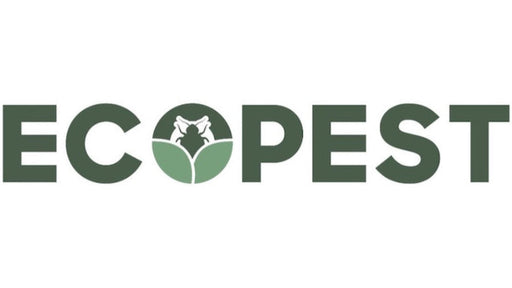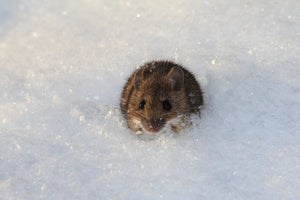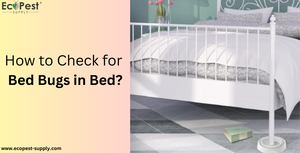
Imagine stepping into your garden, greeted by vibrant flowers and lush greenery, without the unwelcome sight of pests.
This comprehensive guide will explore natural and effective strategies to maintain a healthy, pest-free garden and yard. From choosing the right plants to welcoming beneficial insects, we'll cover all you need to know to create your serene outdoor oasis, without relying on harsh chemicals.
Natural Pest Control Methods
The foundation of a pest-free garden lies in natural, organic methods.
These strategies not only keep pests at bay but also promote the well-being of your plants and the environment, contributing to a pesticide-free garden. One such method is using EcoPest’s Product, a natural solution that targets pests without harming your plants. Unlike synthetic pesticides, natural solutions work in harmony with your garden's ecosystem, strengthening plant health and reducing the environmental footprint.
There are many benefits to using natural solutions, but let’s name a few:
- Safety for plants and soil health;
- No harmful residues on produce;
- Protection of beneficial insects and pollinators;
- Sustainable and eco-friendly approach.
So, even though sometimes the thought of pesticides might look more efficient and faster, the natural approach is much better and safer for you, your plants, and at the end of the day the environment.
Choosing Pest-Resistant Plants
Selecting the right plants is crucial for a pest-free garden. Certain varieties are naturally more resistant to pests, making them ideal choices for a pesticide-free garden. For instance, marigolds are known to repel nematodes and other garden pests, while garlic can deter aphids and beetles.
Research has shown that integrating pest-resistant varieties can greatly reduce pest-related damage, depending on the plant species and the pests involved. These varieties are bred to naturally deter or withstand common pests, making them an invaluable asset in your gardening toolkit.
If you are not sure about the right plants that will work for your garden, here are a few tips and tricks to consider:
- Research: Look for pest-resistant varieties suitable for your specific climate and soil conditions.
- Diversity: Incorporate a mix of these plants to create a robust and resilient garden ecosystem.
- Companion Planting: Leverage the natural pest-deterrent properties of certain plants by strategically placing them near more vulnerable varieties.
Pest-Free Yard: Tips for Outdoor Spaces
Extending pest management beyond your garden to the entire yard ensures a holistic approach to a pest-free environment. Regular maintenance like clearing debris, proper watering, and mowing can significantly reduce pest habitats.
Lawn Care and Maintenance
- Regular Mowing: Keep your grass at an optimal height to discourage pests like ticks and fleas.
- Aeration: Regularly aerate your lawn to improve drainage and prevent waterlogging, which can attract pests like mosquitoes.
- Natural Lawn Treatments: Use organic fertilizers and avoid chemical weed killers to maintain a healthy lawn without harming beneficial insects.
Lighting Choices
- Yellow LED Lights: Use yellow LED bulbs in outdoor lighting, which are less attractive to many insects than standard bulbs.
Wildlife Management
- Bird and Bat Houses: Encourage natural predators of pests by installing bird and bat houses.
- Avoid Attracting Unwanted Wildlife: Secure garbage cans and avoid leaving pet food outside, which can attract rodents and other pests.
Maintaining a pest-free yard involves a combination of good hygiene, strategic planting, and natural pest control methods. By taking a comprehensive and proactive approach, you can enjoy your outdoor spaces without the annoyance and damage caused by common pests.
Beneficial Insects in the Garden
Incorporating beneficial insects into your garden is a natural, effective strategy for pest control.
A study by the University of Missouri found that gardens with a diverse population of beneficial insects can experience a reduction in harmful pest populations. This approach leverages the natural predator-prey relationships to maintain a balanced ecosystem.
Key Beneficial Insects
- Ladybugs: Known for their appetite for aphids, a single ladybug can consume up to 5,000 aphids in its lifetime, significantly impacting aphid populations.
- Lacewings: These insects are effective against a variety of pests including aphids, thrips, and caterpillars.
- Bees: Essential for pollination, bees play a crucial role in the health and productivity of many plants.
Attracting Beneficial Insects
- Diverse Planting: Grow a variety of flowers and herbs that attract these insects. For example, dill and fennel attract lacewings, while marigolds attract ladybugs.
- Avoid Chemical Pesticides: These can harm beneficial insects. Using natural pest control methods ensures that these helpful bugs are not inadvertently killed.
- Provide Habitats: Elements such as insect hotels, small piles of leaves, or even undisturbed ground can provide nesting and overwintering sites for beneficial insects.
Maintaining a Pest-Free Garden Year-Round
Achieving a pest-free garden is an ongoing process that requires attention throughout the year. Each season brings unique challenges and opportunities for garden maintenance and pest control, essential for sustaining a pesticide-free garden.
Spring
- Garden Preparation: Clear winter debris and dead plant matter, which can harbor pests. Begin early with natural pest deterrents.
- Soil Health: Enrich your soil with organic compost to promote strong plant growth, less susceptible to pests.
- Early Planting: Plant pest-resistant and companion plants early in the season to establish a natural defense against pests.
Summer
- Regular Monitoring: Inspect your plants regularly for signs of pest activity. Early detection is key to preventing infestations.
- Water Management: Over-watering can attract pests. Water adequately but ensure good drainage.
- Natural Pest Controls: Continue using natural deterrents like EcoPest’s Product and encourage beneficial insects.
Fall
- Cleanup: Remove fallen leaves and dead plant material, which can be a haven for pests.
- Soil Preparation: Turn the soil to disrupt the life cycle of pests and apply natural fertilizers to strengthen plants.
- Mulching: Apply mulch to protect plants in winter, but keep it away from the stems to avoid attracting pests.
Winter
- Planning: Research and plan for pest-resistant plant varieties and companion planting strategies for the next season.
- Tool Maintenance: Clean and repair garden tools to prevent the spread of pests and diseases.
- Structural Repairs: Fix fences, gates, and trellises, which can provide shelter to pests if left damaged.
By following these seasonal tips and maintaining consistent, mindful practices, you can successfully preserve a healthy, vibrant, and pest-free garden throughout the year. Remember, persistence and adaptability are key to overcoming the challenges each season brings.
Conclusion
Establishing a pest-free garden oasis is a rewarding journey that blends meticulous planning with nature-friendly practices.
Using natural pest control methods, such as EcoPest’s Product, and integrating pest-resistant plants, are key steps in creating a harmonious and healthy garden ecosystem. This approach not only deters pests effectively but also protects the environment and promotes plant vitality. The importance of seasonal care and the strategic incorporation of beneficial insects further fortify your garden against pest invasions, ensuring it remains a vibrant and serene haven all year round.






